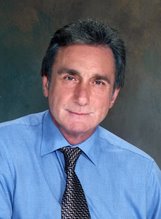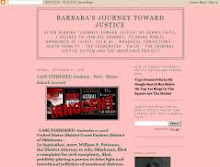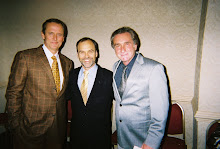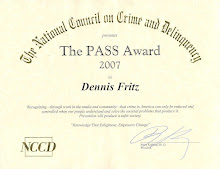I just read an interesting story from Justice Denied,
The magazine for the Wrongful Convicted and thought it was a story worth sharing with my readers.
Justice:Denied magazine publicizes cases of wrongful conviction, and exposes how and why they occur. Justice:Denied is produced by a team of volunteer writers, editors and other staff persons located throughout the United States.
See below for contact information. Here is the story:
Prosecutors Are Master Framers By Hans Sherrer
Watching movies and television shows for decades has conditioned us to have the Pavlovian response of thinking that police are the culprits when people are framed.So it was that instead of presenting us with a new idea, the internationally televised O. J. Simpson trial was a real-life affirmation that police plant evidence, falsify reports and commit perjury in court.
The opinion of many people that in O. J.'s case the police worked hard to frame a guilty man doesn't change what they did. It just emphasizes that fame and wealth doesn't protect someone from being vulnerable to such tactics. However, as reprehensible as the unethical behavior by police can be, focusing on it tends to deflect attention from the bigger picture of how people are successfully framed. Police misbehavior alone is not enough to convict a person.
This is because police investigations are typically conducted under the watchful eye of a prosecuting attorney, and even when they aren't, a prosecutor must give his stamp of approval to a case before criminal charges can be pursued against someone.
This means that no police wrongdoing can ever see the light of a courtroom without the complicity of a willing prosecutor. To one degree or another, all frame-ups of people are orchestrated by prosecutors acting behind the scenes. This is as true of the highpercentage of plea bargains compelled by the threat of a false conviction, as it is by the actual presentation of phony evidence, deceptive arguments, and perjured testimony during a trial.
One of the most effective ways prosecutors contribute to framing people is by manipulating their access to evidence in the government's possession that may tend to cast doubt on their guilt.
This is known as discovery evidence, and as a guard against false convictions the U. S. Supreme Court recognized a defendant's right to this information in Brady v. Maryland (1963).
The investigative resources of the government exceed those available to any private person. This includes the world's richest man, Bill Gates. Therefore, if there is physical or testimonial evidence that someone isn't guilty, it is often in the possession of the prosecution, yet revealing exculpatory evidence to a defendant can undermine the government's case.
This situation creates an irresistable temptation for prosecutors across America to thumb their noses at the Supreme Court and at the rights of all Americans by hiding the existence of evidence that may interfere with convicting an accused person. Ironically, this means that innocent people are rarely helped by the pre-trial discovery process because it is in the personal and professional interest of prosecutors to conceal potentially exonerating information from them.
There are numerous cases of wrongful conviction known to have been orchestrated by the concealment of evidence by prosecutors. These cases span the length and breadth of the country and include state and federal courts. A representative example is Ellen Reasonover's case, reported in the September 1999, issue of Justice Denied. A federal judge in Missouri ordered Ms. Reasonover released in August of this year after she had spent 16 years in prison for a murder she didn't commit. She was framed by prosecutors who concealed the existence of two exonerating audio tapes and who bought the perjured testimony of two "jailhouse" witnesses for the state.
Irrespective of the possible merits of the government's case, thegovernment creates the appearance that it knows a defendant is falsely accused when it conceals evidence.
An example of this is the recent revelations that for six years the U. S. Department of Justice concealed testimony and physical evidence related to the siege and destruction of the Branch Davidians' compound in Waco, Texas in 1993.
[1] The Branch Davidian survivors convicted of criminal charges were partly framed by this concealed evidence, and some of the jurors misled by federal prosecutors into convicting them are now advocating their release from prison.In addition to withholding evidence, some of the popular techniques prosecutors use to frame defendants are:
• They permit, encourage, compel, or purchase perjurious testimony in Court by prosecution witnesses. In Ellen Reasonover's case, for example, the prosecution paid cash for the testimony of one witness and rewarded another witness by dropping felony charges against her.
• They permit or encourage the introduction of tainted or phony evidence in Court. This can be done by introducing tests conducted on contaminated physical evidence, introducing fake evidence, or introducing planted objects as authentic.
• They overcharge or pile on charges to compel an innocent person to plead guilty to avoid a devastatingly long or harsh sentence if they go to trial and lose.
The effectiveness of this tactic is indicated by a study published in the Harvard Law Review that concluded that over one-third of everyone who pleads guilty in a federal court would have been acquitted after a trial.
[2] This finding is confirmed by the known cases of innocent people who pleaded guilty to murder to avoid a possible false conviction and death sentence.
[3] They make unsupported, disparaging and inflammatory remarks about a defendant and the motives of the defense lawyer so that jurors will have an emotional, rather than rational response, and want to convict a defendant the prosecution hasn't proved to be guilty beyond a reasonable doubt. It is abhorrent to the very concept of justice, but it is becoming increasingly common knowledge that state and federal prosecutors are participating in framing defendants with monotonous regularity. This isn't surprising considering that prosecutors are given a green light to do so by a lack of negative consequences when their wrongdoing is uncovered.Although prosecutorial tactics are regularly recognized by courts as deplorable, it doesn't stop defendants from being framed by prosecutors. This is due in large part to the narrow interpretation by courts of what is known as the "harmless error" rule.
If a prosecutorial tactic isn't considered sufficient in and of itself to have altered the outcome of a trial, it is dismissed by courts as a "harmless error." Therefore, prosecutors know that as long as they use tactics to frame a defendant that aren't excessively obvious or prejudicial of their rights, these won't be deemed a sufficient reason to reverse a conviction or even prompt a judicial reprimand. A dramatic example of this was the recent denial of Terry Nichols'motion for a new trial. He sought a new trial on the grounds that the government deliberately concealed the existence of 43,000 documents he had the right to review prior to his 1997 trial in Denver, Colorado, for his alleged role in the Oklahoma City bombing.
[4] The prosecution was given a helping hand by the illegal concealment of these tens of thousands of documents and the FBI admitted hiding them from Nichols. However, U. S. District judge Richard Matsch ruled that their concealment wasn't enough of an error to have deprived Terry Nichols of a fair trial, so it was ruled a "harmless error."
[5] Since prosecutors suffer no personal or professional penalty for participating in framing people, there is no downside for them.
The U.S. Supreme Court, for example, granted prosecutors absolute immunity from civil liability when exercising their prosecutorial functions in Imbler v. Pachtman (424 U. S. 409, 1976). Likewise, they face no criminal responsibility for their actions because history has shown that with very rare exceptions, prosecutors don't prosecute fellow prosecutors. This means a prosecutor can withhold evidence tending to show that someone accused of murder is innocent, and if it is brought to light after the person is convicted, sentenced and executed, that the information was withheld, the prosecutor doesn't have to worry about being criminally charged.
Prosecutors are even protected from prosecution when they leak secret grand jury testimony to the news media.
[6] One small ray of light in this otherwise bleak scenario is the Citizen's Protection Act of 1998 (28 USC 530B) which went into effect in April of this year. Although severely watered down from the version first introduced for consideration by Congress, it makes federal attorneys subject to the state bar ethics rules and disciplinary proceedings that apply to all other lawyers in the state where they are located. However, since bar associations are loathe to discipline private attorneys who lack the political pull of a U. S. Attorney, the protection provided Americans by the Citizen's Protection Act is more symbolic than real.
Prosecutors are well aware of their privileged position and they are opposed to being constrained from exercising their power in any way. The Justice Department, for example, vigorously lobbied against the minimal restraints imposed on its behavior by the Citizen's Protection Act. A congressional aide explained this by remarking that U. S. Attorneys "get hysterical about being subjected to external ethical standards. They don't want to have to live by rules."
[7] When he was the Attorney General of the U. S., Robert Jackson recognized the power he and his colleagues possessed when he noted in a speech, "The prosecutor has more control over life, liberty, and reputation than any other person in America."
[8] Considering what is known about human nature and the way absolute power tends to corrupt people, it isn't surprising that working in an environment of non-accountability brings out the worst behavior imaginable in prosecutors.
Framing people is one way prosecutors express the corrupting influence of power. The illicit behavior of prosecutors is compounded by the powerful incentives they have to engage in wrongdoing. One of these is that the performance rating of a prosecutor can be based on his or her conviction rate in the same way a batting average is used to judge a baseball player.
Their ability to obtain a high conviction rate is often used as a promotional tool for gaining a political or judicial office or appointment. Janet Reno parlayed a tough reputation as Miami's state attorney into her appointment as U. S. Attorney General.
As contrary as it is to the American notion of justice, prosecutors have nearly free reign to manipulate the judicial process for their own benefit. The tactics they use to get convictions have caused various commentators to call them our modern version of medieval torturers and lawless gunmen.
[9] With this freedom to be unaccountable, it is no wonder that prosecutors can accumulate the experience necessary to acquire the dubious honor of being recognized as master framers. The End
1] See e.g., FBI's 'Waco boys' had role at Ruby Ridge: Same discredited officials ran both cases," Thomas Shapley, Seattle Post-Intelligencer, September 19, 1999, p. G2; and "Storm Clouds Gather Above Waco, Texas," Thomas Shapley, Seattle Post-Intelligencer, August 29, 1999, p. E2.[back to story] [2] "A Statistical Analysis of Guilty Plea Practices in the Federal Courts," Michael O. Finkelstein, Harvard Law Review, Volume 89, Number 2, pp. 293-315 (December 1975). [back to story] [3] See e.g., "In Spite of Innocence: Erroneous Convictions inCapital Cases," Michael L Radelet, Hugo Adam Bedau, and Constance E. Putnam, Northeastern University Press, Boston, 1996, Inventory of Cases at pp. 282-356.[back to story] [4] "Nichols: FBI withheld key data," Howard Pankratz (staff writer), Denver Post, July 8, 1999.[back to story] [5] "Terry Nichols denied new trial," Mike McPhee (staff writer),Denver Post, September 14, 1999. In October of 1999, the U. S. Supreme Court let Terry Nichols' conviction stand by refusing to review his appeal (see:http://news.findlaw.com/News/s/19991012/courtnichols.html).[back to story] [6] "Court Order to Prosecute Starr Overturned," Pete Yost (AP),Seattle Post-Intelligencer, September 14, 1999, p. A4. [back to story] [7] Quoted in "Games Prosecutors Play," Wendy Kaminer, TheAmerican Prospect, Sept./Oct. 1999, Number 46, p. 26.[back to story] [8] "The Federal Prosecutor," Robert H. Jackson, Journal of Criminal Law and Criminology, Vol. XXXI, 1940-1941, p. 3, text of speech given April 1, 1940, in Washington D. C.. [back to story] [9] For a comparison of prosecutors to highwaymen who get what they want by holding people at gunpoint, see "Criminal Justice and the Negotiated Plea," Kenneth Kipnis, 86 Ethics 93 (1976). For a comparison of prosecutors to medieval torturers, see: "Torture and Plea Bargaining," John H. Langbein, The Public Interest, Number 58, Winter 1980, pp. 43-61. [back to story]Sources:"Prosecutorial Misconduct," Bennett l. Gershman, Clark, Boardman, Callaghan, a division of Thomson Legal Publishing, Inc., Sept., 1997, 12th release, esp. chapter 13: "Sanctions for Misconduct," pp. 13-1 to 13-29."Prosecutorial Misconduct: The Limitations Upon the Prosecutor's Role As An Advocate," John H. King, Jr., Suffolk University Law Review, Vol. XIV, No. 4, Summer, 1980, pp. 1095-1135."Forensic Misconduct by Federal Prosecutors -- and How It Grew," Singer, 20 Alabama Law Review 227 (1968)."Good Samaritan Freed 16 Years After One Juror Saved Her From A Death Sentence," Hans Sherrer, Justice Denied, September, 1999, Vol. 1, No.8.
If you want to submit a story of wrongful conviction to Justice:Denied, the guidelines are at, http://justicedenied.org/submita.htm. After reading the guidelines, you can either send a completed story by email, or by regular mail to: Justice Denied, PO Box 68911, Seattle, WA 98168.
Justice:Denied has an information packet that includes the submission guidelines, JD's informational brochure, subscription info, and other information. (Please include 41¢ or SASE) Write: Justice Denied PO Box 68911 Seattle, WA 98168
Emailers please note: Justice:Denied uses the RTF file format for attachments to maximize compatibility between the different programs and operating systems used by its team of volunteers. If an attachment is sent, please clearly explain the purpose of the email on the subject line and what the attachment is in the body of the email. With the proliferation of intellient worms and viruses, a suspicious appearing email will likely be deleted without its attachment being opened.
Please Note: Justice:Denied cannot be responsible for, nor does it have any control over the decisions of a prison mail room concerning incoming mail. Once mail from Justice:Denied arrives at a prison mail room, it is under the prison's control and they can choose to deliver it or not. If you do not receive mail sent from Justice Denied, please submit the appropriate paperwork to the prison staff, and then contact Justice Denied with any information you are able to find out.
Subscribe to:
Post Comments (Atom)














No comments:
Post a Comment